“You know what I was thinking?” asks Rosa, a very nice woman whose name I wish I didn’t know. “What I really need to know is, how you guys got together.” She’ll wish she hadn’t asked.
“Well,” says her son, Mark, who is 24.
“Yeah,” says Mark’s fiancé, Jessica, who is 34, and whom Mark’s family is meeting for the first time. Jessica would want me to mention the age difference, about which she frets constantly.
“Yeah,” Rosa agrees. “Because in two weeks, he’s engaged.” Meaning her son. She clutches her chest, terrified. “Oh my God.”
“Well, so, here’s the deal,” begins Jessica carefully. She clears her throat. We’re in Rosa’s house. It is Episode 7 of the Netflix reality series Love Is Blind, wherein single people speed-date in separate rooms, without ever seeing each other, until they agree to marry each other. The penultimate 10th episode goes on for nearly 90 minutes and features five separate weddings, three of which end in disaster; I watched the whole thing while playing poker on my phone as an emotional defense mechanism. Episode 11 is an awkward reunion deal in which someone says, “Bitch, you shiesty” to Jessica. I played more poker. That’s the deal.
Right now, though, it is Jessica’s job to lay out a plainly horrifying premise in a whimsical and romantic way. (This week, Jessica popped up on The Ringer’s Best Reality TV Character bracket, in the “Antagonists” region, where she lost in the first round to Omarosa. Draw your own conclusions.) “There’s this whole setup, it’s called the Pods,” her description begins. “It’s almost like a confessional, like if you’re a Catholic. And all of a sudden you hear, [sexy voice] ‘Hello?’ From a guy. And you’re like, [another sexy voice] ‘Hey.’”
Rosa makes a horrified face.
“So I just start talking, and I got through a couple really terrible dates,” Jessica continues. She might be referring here to Barnett, a mischievous semi-playboy who almost proposed to her but didn’t, and about whom she still frets constantly. “And my third date was Mark.” She turns to Mark, who is gentle and docile and maddeningly patient, and whom she likes about 500 percent less since they left the Pods, on account of his not being Barnett. “And it was so easy, with him, immediately.”
Rosa groans—viscerally groans—and clutches a large glass of wine.
Jessica and Mark hurriedly list all the rad stuff they have in common. Chicago. Golden retriever. Super Christian. Italian beef. Meanwhile, somewhere in the midst of all this, Mark’s brother, also sitting at the table, hits them with one of these.
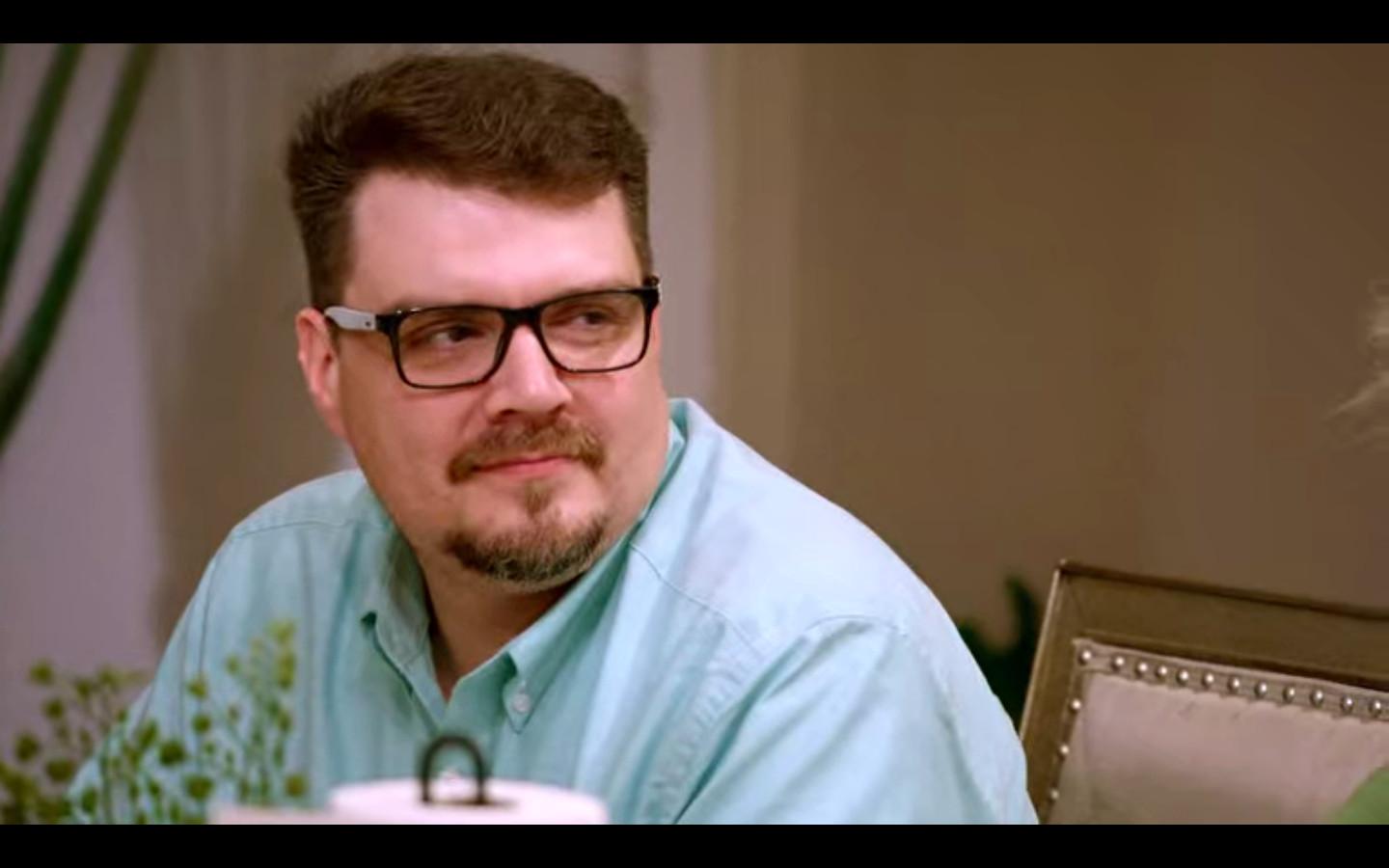
Recently, I watched around 30 hours of three 2020 Netflix reality shows that already land quite differently here in the midst of the COVID-19 pandemic, given our new self-quarantined reality, given our banishment to various pods, given the lasting social breakdown that seems bound to result. I can’t explain why Mark’s brother’s smirk was the single funniest moment of this experience, which as a whole I did not, strictly speaking, enjoy. For those of us galactically fortunate enough to have our health and some semblance of security, this is a time of relative isolation, of futile distraction, of mild but steadily rising anxiety. Have you worried that it would only take months, and not necessarily years, to lose the ability to carry on a face-to-face conversation with anyone not already living with you? I worry about this.
Love Is Blind premiered the day before Valentine’s Day, which is somebody’s idea of a joke. In mid-April came Too Hot to Handle, a proudly stupid lark in which a dozen or so horny hardbody knuckleheads convene on a luxurious island resort only to be informed—by a stern, conical, Alexa-like digital assistant named Lana—that they’re not allowed to have sex with or even kiss one other, lest Lana sternly deduct some percentage of their $100,000 prize. “Right, I’m gonna fuck a wall,” announces an extra-horny Australian named Harry, “or I’m gonna find a deeper connection.” On camera, at least, he does not fuck a wall.
Those shows followed the January debut of The Circle, a social media experiment in which a dozen or so less horny/knuckleheaded contestants all live in the same apartment complex, but all shut away in their own solo apartments, communicating only via a voice-activated texting app on their televisions, with another $100,000 prize for the most popular digital persona, as voted by the players themselves. Mild catfishing high jinks ensue; for most of the show, you only get to meet someone in person when you get voted out. Most incredibly, The Circle predicted our current global circumstances—locked up in our living rooms, lonely and bored and muttering to ourselves or to our various screens—so exactly that someone should probably be arrested.
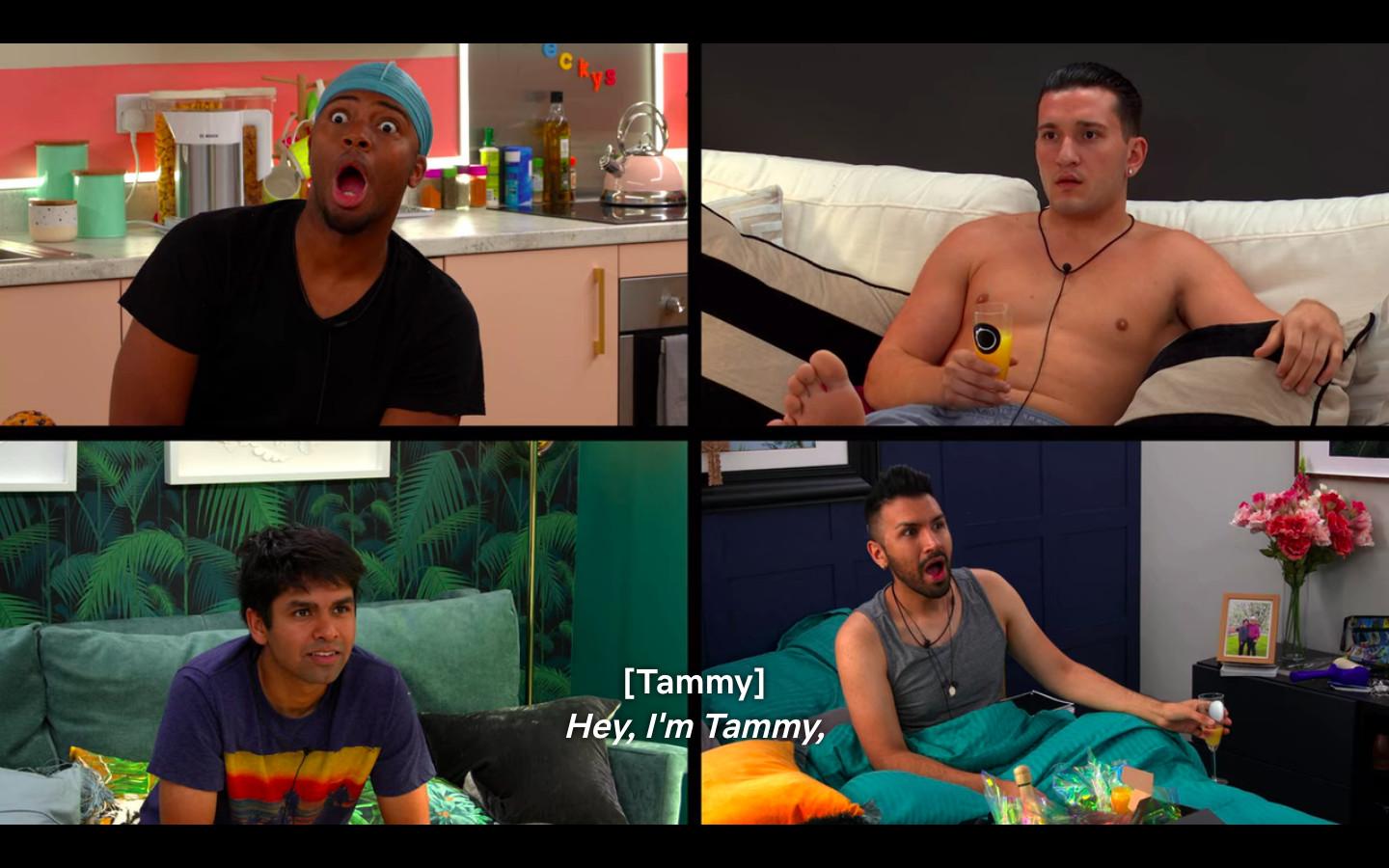
Tammy is a contestant’s mother, and was underutilized; it’s a long story. The point is I wondered whether any of these people, in any of these various ridiculous situations, could teach us anything about navigating our own respective ridiculous coronavirus-era situations. I think you know the answer to that already, but thank you in advance for acting Tammy-caliber surprised.
Let it be known, though, that the most joyous human-to-human interaction I witnessed—across 31 full TV episodes that featured constant horny-knucklehead hookups and six different marriage proposals—takes place between two Circle catfishers. Seaburn, the extra-shocked fella in the upper left up there, is pretending to be a flirty but shy lady named Rebecca, using photos of Seaburn’s IRL girlfriend. Alex is a walking Weezer cover band, all slovenly L.A.-doofus charm and ridiculous tie-dye pants, who via various random bro-cheesecake photos is pretending to be the far buffer and slicker Adam. (Alex is married IRL and can no longer flirt for shit, a secret he betrays by flirting via such words as romp and arouse.)
Anyway, Alex and Seaburn greet each other as their true selves, in Seaburn’s apartment, with unashamed brothers-home-from-the-war joy, with bear hugs and ebullient whoops and many sincere compliments. Hey. Look at us. “You’re doing what I wish I could’ve done!” Alex marvels, with regard to Seaburn’s brazen gender swap. Then they bring it in for another bear hug, this time adding Sir Bear Bear, the life-size stuffed animal that “Adam” had previously gifted to “Rebecca” in a shoddy attempt at flirtation. Seaburn has a future in prop comedy; Sir Bear Bear is the most compelling character on The Circle by some margin. Just trust me. Just talk to me about this, about anything. Because what a jarring feeling it was, as Alex and Seaburn and Sir Bear Bear did rejoice together, to want so desperately what the three of them had.
The architecture of the Pods on Love Is Blind has an eerie, brutalist, science-fictional, Devs-like gravity to it, which is terrible news if you’ve watched Devs but already plenty bad news if you spend even five minutes watching Love Is Blind.
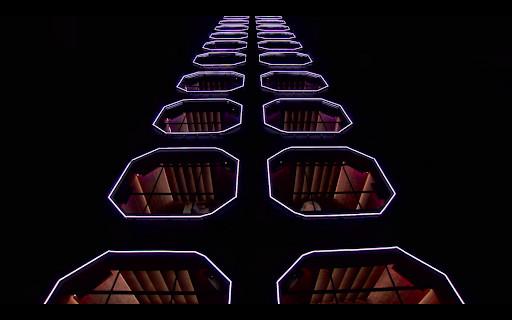
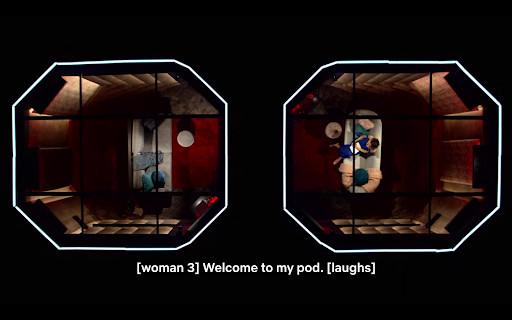
The deal here, very simply, is that the better the people onscreen feel—the closer and warmer and flirtier and more In Love they get—the worse you feel on their behalf. This show is proudly, flagrantly perverse. For the six new couples who attempt a season-long arc—chat in the Pods for a few days, propose marriage, see/touch each other for the first time, decamp to Mexico for a quick resort vacation, move into an Atlanta apartment together, meet each other’s parents, and get married, all within about a month—your nausea sharpens the farther along that arc they get.
To wit, the first couple implodes spectacularly in Mexico; multiple indignant quotes from the Beyoncé song “Don’t Hurt Yourself” are involved. (Watch her bounce to the next dick, boy.) It’s a lot. It’s so much. You win this game by losing, quickly; far better to avoid finding a soulmate at all, say one memorable thing in Episode 1 (even if that thing is I’m a virgin), and then get the fuck out of there.
For our young lovebirds who don’t get the fuck out of there, they know that everyone thinks they’re fucking up, but in the Pods it all feels so logical, so natural, so right. Their adjoining spaces are separated only by a glowing, purplish, opaque window, their voices crystal clear to one another, their personal spaces separate and yet furnished the same. Couch. Blanket. Throw pillows. Footstool. Notebook. Maybe a ukulele.
They betray their true feelings by fidgeting with all that stuff, or really just by being. Sitting on couch: neutral. Lying on couch: heightened comfort. Leaning back on couch staring at ceiling: rapture or imminent breakup. Sitting on floor in front of couch: heightened intimacy. Pressed to glowing purple wall: about to propose or accept proposal. Crouched down behind couch: no proposal. Draped over one end of couch, painfully, joyfully: just accepted proposal.
They flirt, they clash, they bond, they reveal, they connect. Remember: Chicago. Golden retriever. Super Christian. Italian beef. Or, Parkinson’s disease. Tomboy. Weight loss. Bullying. Masculinity issues. Race issues. Intimacy issues. Maturity issues. (“Are you clumsy?” inquires Barnett, mischievously, to one of his many options. “What about in bed?”) Age difference, age difference, age difference. Previous heartbreaks. Current heartbreaks. Soul connections. These two aren’t a couple.
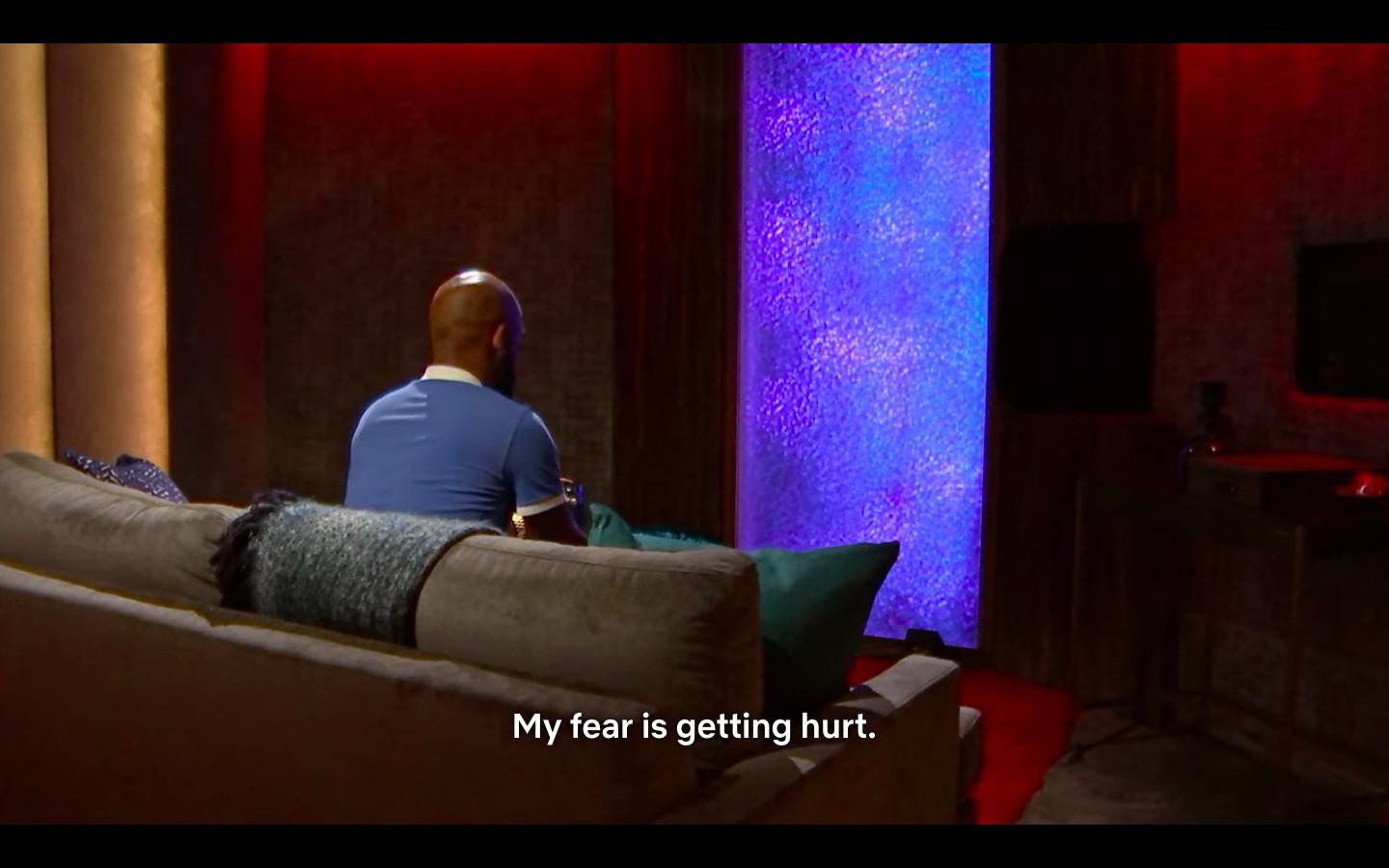
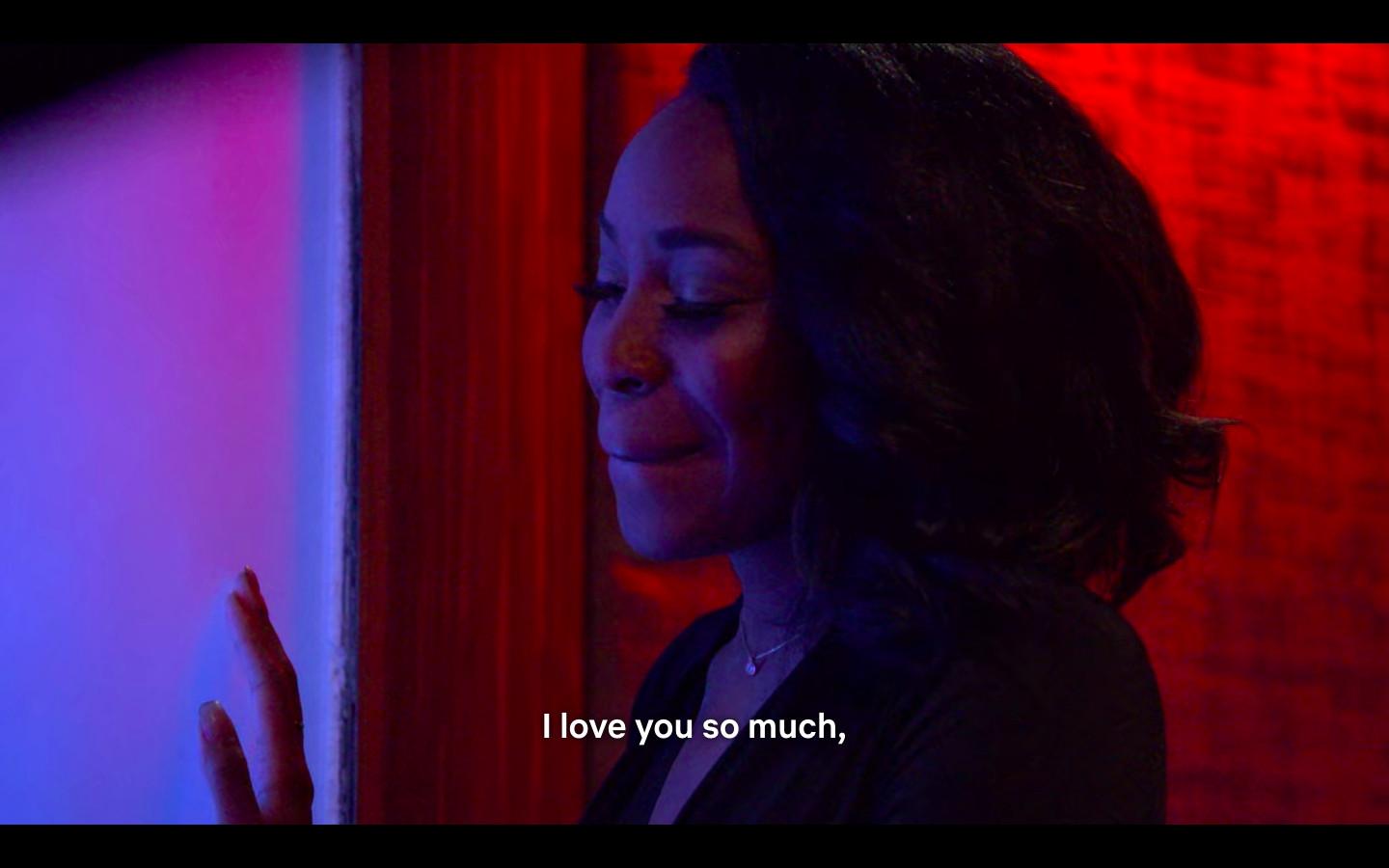
Love Is Blind loses a great deal of its singular nauseating power once everyone leaves the Pods, once our lovebirds are out in the real world, once everyone’s fumbling through your standard reality TV trying to make it work but it probably won’t work scenarios as their friends and family look on in undisguised horror. (The wedding groomsmen, intriguingly, tend to be the most revulsed.) The cringing confab between Jessica, Mark, and poor Rosa is actually one of the show’s smoother Meet The Parents moments. Some parents won’t participate at all. Elsewhere, Cameron, the tender scientist, finds himself grilled by his bubbly fiancé Lauren’s super-unbubbly father (“Have you ever been in a room full of black people?”) and on another occasion somehow finds himself rapping to Lauren’s mother like Kendall Roy. And Lauren and Cameron are by far this show’s sweetest and sturdiest success story.
In fact, let’s check out how L&C are handling self-quarantine. A way cheerier Beyoncé song is involved.
Fantastic. Let’s do Barnett real quick.
Seems legit. These people know a thing or two about being uncomfortably cooped up with one other. “I’ve been through three quarantines now,” wrote a ferocious Love Is Blind combatant named Giannina in a Playboy essay just last week, and never mind right now about the second one. “I fear for our health, the impact on our world, and how will we get out of it, but at the same time I now know how to use this time for good.” (Her partner, Damian, has villainous tendencies and more or less cops to transforming into a completely different person outside the Pods, but good luck to all three of them.)
What animates the second half of Love Is Blind—as all those very possibly awful, awful, awful wedding days creep ever closer—is the way that all the couples, solid or otherwise, describe the Pods in retrospect as a utopia, as an Eden, with little conflict, no distractions, and absolutely no interaction with the big, bad outside world. As relationships go, at least, the only thing scarier than all this isolation and frustration and sensory deprivation is leaving it behind. Poor old Mark and Jessica, in fact, only fully connect outside the Pods when he patiently recreates them in their shared apartment: separate rooms, rose petals, pillows, wine glasses. And boom, she opens right up, sitting there on the floor, out of sight. Her childhood. Her dad. Abandonment issues. Self-quarantine, in this stylized and cruel and theoretically romantic environment, is a hell of a drug.
There is very little cruelty, or unease, or for that matter tension on The Circle, which over 12 episodes settles into a casual and often disarmingly lovely groove. The instances of conflict or even vague competition are sparse, and nobody much gives a shit about the money; it’s all boring in a way that doubles as therapeutic. Hell is other people, but held hostage in their quirky little fully stocked apartments, Stockholm syndrome sets in immediately. It’s all very sad, and very cute.
Indeed, in the original British version, a childless 20-something dude pretended to be a single mom and almost won. But in the Netflix revamp, even the catfishes are benign Sexier Version of Me goofs that nobody gets too pissed about, and most contestants are content to be quote-unquote themselves. This includes Shubham the proud nerd who tries to coin the phrase Social Medusa, and Joey the sappy beefcake mama’s boy who leans way into his shtick, and Sammie the cautious party girl who says things like, “I’m just full-force gonna go all out and show them what my body looks like, and see what they have to say about it” with just the right amount of self-awareness. I am not surprised to see that all of these people are thriving lately, or at least not publicly foundering.
What you mostly do on The Circle, then, is watch medium-charisma goofballs fart around (ping-pong, journaling, coloring, cooking, cleaning, reading books that usually have no covers presumably for copyright reasons, conspiring with Sir Bear Bear) in between quick, audible bursts of ludicrous chatspeak. They dictate text messages to themselves, basically. It’s mesmerizing.
“God knows my heart but the devil knows my vocabulary. Exclamation point.”
“I’m coming to get you girl hashtag yeah buddy.”
“You’re both very attractive as well. Maybe we’ll do like the laughing sweat-on-the-forehead face. Are you both just into men question mark.”
“Message. I am actually in tears. I am an extreme nervous wreck. Send.”
“Message, hashtag, Destiny’s Child, heart emoji, send message. That says a lot, but it says very little, too.”
“Message, you know, dot dot dot, someone who can really handle all of me. Send. Oh, Christ.” (That’s Alex/Adam/Weezer, struggling.)
“When I saw your pictures, I was like, emojis, hearts in the eyes, let’s send, like, four of ’em.”
“Message, that’s a really difficult question. I’ll say this. When you come over, I guess my body belongs to you. Eyes looking emoji. Quiet emoji. Bottle popping emoji. Red hot chili pepper emoji. Send.”
Amid the posturing panopticon “Netflix reality show” fakeness of all of this, there’s something poignant about watching a bunch of harmless, bored humans try to suss out who among them is “real.” From your couch, everyone’s real enough. The Circle only occasionally remembers it’s a competition, and makes everyone rank one another by sheer popularity, and then the top two “influencers” decamp to adjoining rooms to decide who gets the boot, still invisible and inaudible to each other, still communicating via text-speak, but now we at least get a few images striking in their emoji-mumblecore loneliness.
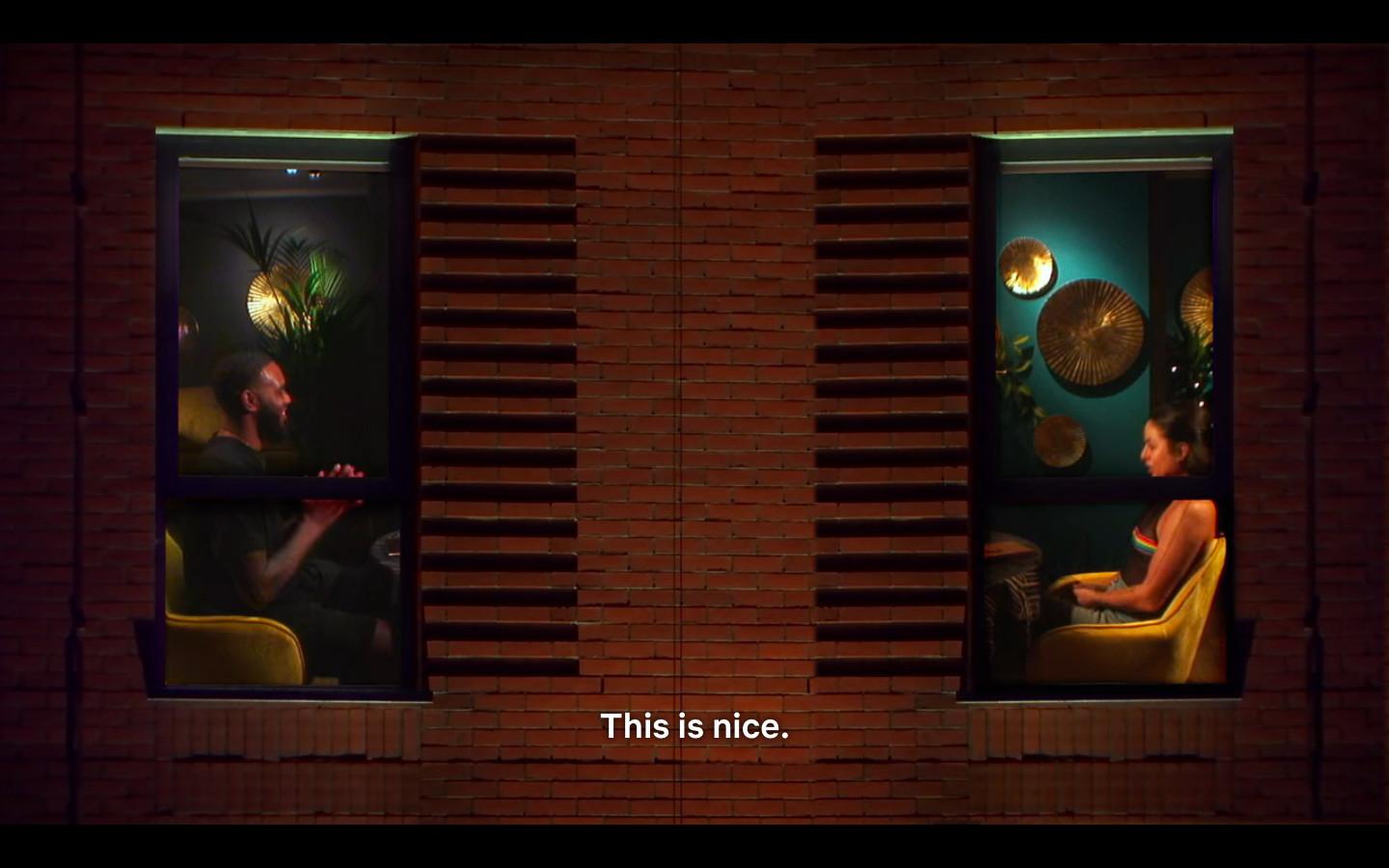
My favorite thing in reality shows is when they introduce tiresome new characters way too late in the process, and they’re plainly flabbergasted by the rapport long ago forged by the original people, and they can’t relate to it at all, and they just naturally assume it’s all craven bullshit, and they wind up getting pissed and immediately ostracized. You can’t understand what it’s like in the pods—any show, any pods—if you’ve not been trapped in one, clinging to all the other lonely people trapped in their own. I just hope that sort of camaraderie translates to real life on a global scale.
The Circle withholds physical human contact so effectively that the half-dozen or so such encounters unfold with Oscar-reel depth of feeling. A nervous Sammie clutching her pillow as a cheery model named Alana, cheerfully irate that she’s been accused of taco-loving inauthenticity, harmlessly seethes. The first guy who discovers he’s been catfished (“NO! NOOOO!! NOOOOO!!!”) and loves it. A single, semi-amorous chili-pepper-emoji kiss. Two vibrant platonic kindred spirits—from Dallas and the Bronx, respectively—mashed together on a couch, ebullient, their hands piled on one another, earnesty telling each other they’re friends for life and believing it.
If you don’t believe them by that point, why watch the show long enough to reach that point? “I had to see if you was legit,” one late IRL meetup starts, and on a long enough timeline everyone is, and given the state of the world, what does it matter anymore if you’re not?
Too Hot to Handle’s mid-April premiere on Netflix registered as a straightforward taunt to those of us sheltering in place, from the flashy tropical locale to the industrial-strength vapid banter. “Sorry about my shorts, they’re a bit tight.” “My ideal type of guy, they have to have a job.” “Romeo and Juliet didn’t have any fans. OK, obviously that ended like a tragedy. But, like, you know, they had a good time, regardless of what other people thought.” “I don’t think I’m learning anything other than everyone in this house is an idiot.” “The list of offenses includes kissing, inappropriate touching of the [bleep], constant use of the [bleep] in the [bleep]. Not to mention the [bleep].”
That last one is Lana, a.k.a. Cockblocking Alexa, doling out some severe fines after two horndogs fail to restrain themselves during a night in the Private Suite, and the bleeps are hers. In eight short episodes, we are also subjected to, like, 400 this is really hard puns. They’re all just full-force gonna go all out and show you what their bodies look like, and see what you have to say about it. I will not insult this show’s intelligence by suggesting it has any.
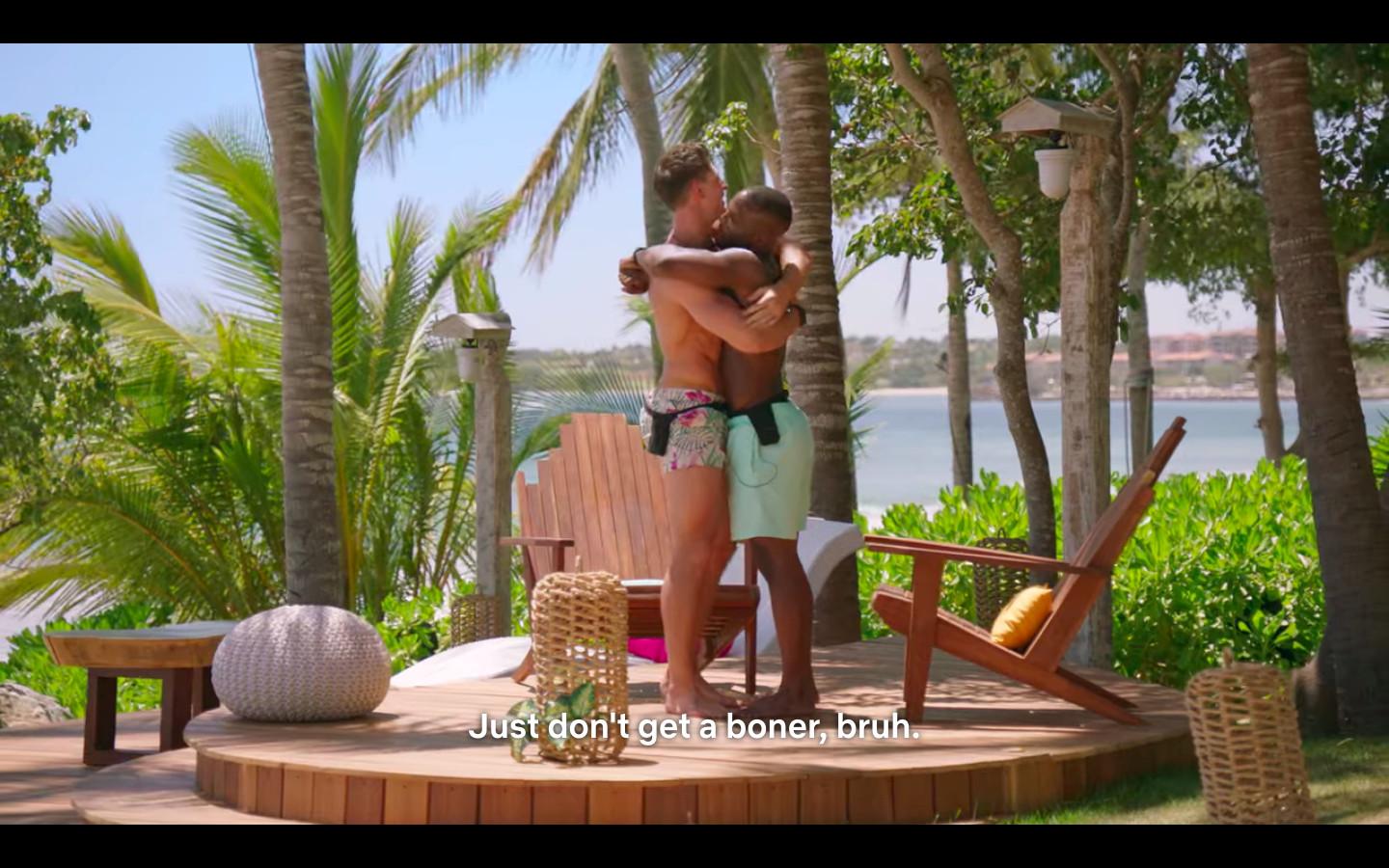
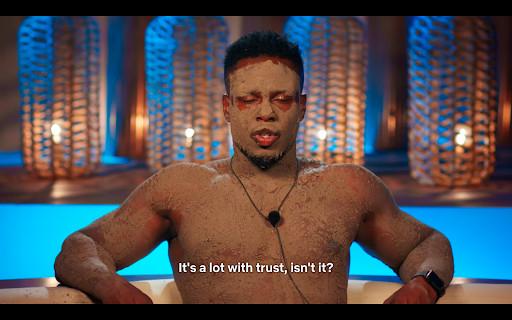
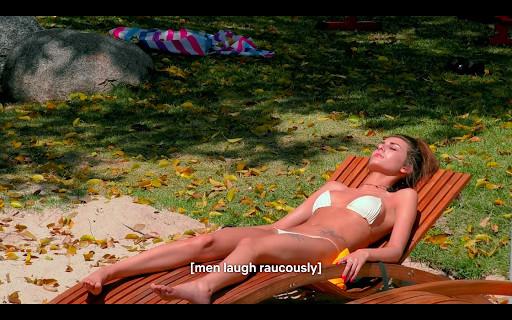
A warning, though, to all you single people sheltering in place: You’re all going to act like this if you’re ever allowed to leave your homes again. You’re going to be rusty; you’re going to sound ridiculous. You will refer to potential romantic partners as “naughty little quesadillas.” You will explain your latest soul connection with lines like, “Me and Kori have got quite a few things in common, but being intellectually not that smart is one of them.” In terms of smoothness, in terms of wit, in terms of any semblance of game, these uncertain times might prove to be that mythic Great Equalizer a bathtub-lounging Madonna recently told us about. We’re regressing. Just roll with it. There is nothing to learn right now but how to cope, and much comfort in the spectacle of all of us trying and failing to cope, alone, together.
